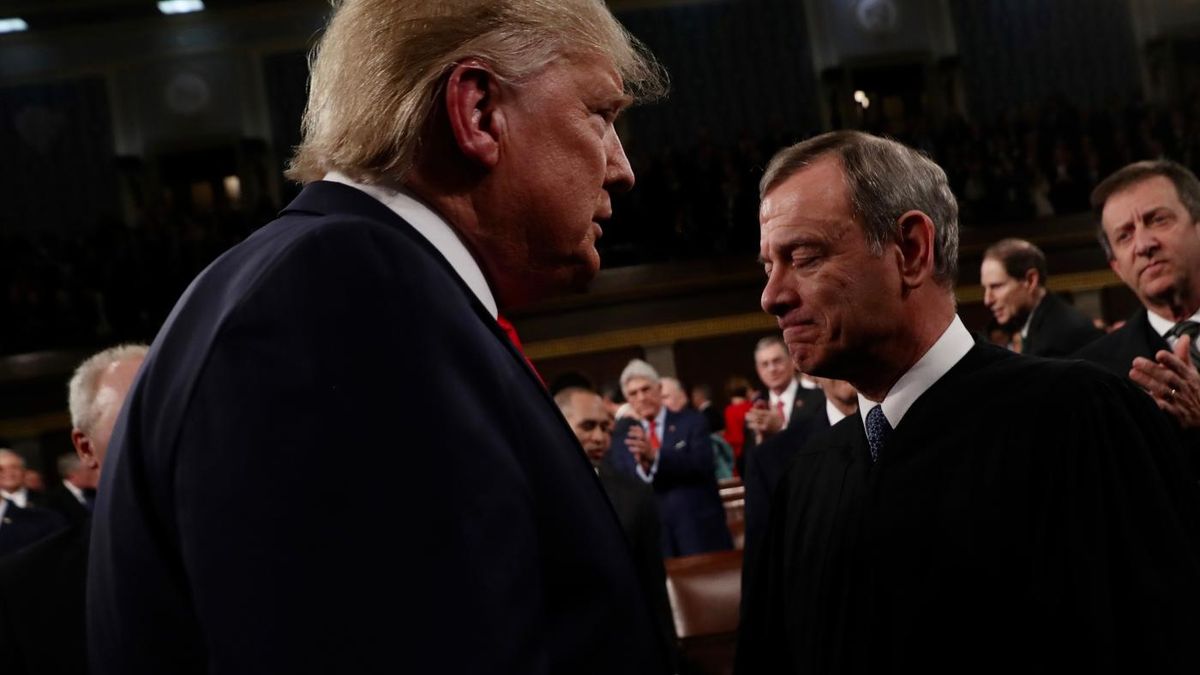Supreme Court rules Trump not immune from New York prosecutor’s subpoena demanding his tax returns

A few minutes every morning is all you need.
Stay up to date on the world's Headlines and Human Stories. It's fun, it's factual, it's fluff-free.
On Thursday, the United States Supreme Court announced by a ruling of 7-2 that President Donald Trump is not immune from New York District Attorney Cyrus Vance’s subpoena seeking Trump’s tax returns from his accounting firm, Mazars USA.
Chief Justice John Roberts penned the majority opinion. Roberts was joined in his majority ruling by the court’s four liberal justices and two conservative Trump appointed judges, Neil Gorsuch and Brett Kavanaugh. Conservative justices Clarence Thomas and Samuel Alito dissented.
Citing an ancient maxim, Roberts wrote, “In our judicial system, ‘the public has a right to every man’s evidence’. Since the earliest days of the Republic, ‘every man’ has included the President of the United States.”
Roberts went on to add, “We reaffirm that principle today and hold that the President is neither absolutely immune from state criminal subpoenas seeking his private papers nor entitled to a heightened standard of need.”
However, the court sent back the case to a district court for further review, with Roberts stating that Trump may still choose to object to the scope and relevance of the subpoena. This means that as of now Vance can’t access Trump’s tax returns.
Furthermore, as Trump’s tax returns are subject to the secrecy rules of a grand jury investigation, they wouldn’t be made public until after the presidential elections, even if they are released to Vance by Trump’s accounting firm.
Vance’s subpoena to Trump’s accounting firm sought eight years of Trump’s business and personal tax records.
The subpoena is part of Vance’s investigation into whether Trump altered business records to conceal the hush money payments made by him and his campaign before the 2016 election to the two women Trump was accused of having an affair with.
A New York Times investigation revealed that Trump and his company reimbursed his former lawyer, Michael Cohen, for payments made to pornographic film actress Stormy Daniels and Playboy model Karen McDougal, both of whom claimed they had an affair with Trump. These payments were in violation of campaign finance laws.
Trump has denied the affair allegations.
In September 2019, Trump filed a lawsuit against Vance in an attempt to block his subpoena. However, the United States Court of Appeals for the Second Circuit in New York ruled unanimously against him.
Following that ruling, Trump’s personal attorney Jay Sekulow stated that he would appeal to the Supreme Court.
In May, Trump’s attorneys, including Sekulow, asked the Supreme Court for “temporary presidential immunity” against the subpoena.
In Thursday’s ruling, the court denied Trump such immunity, pointing to landmark court rulings that required former US President Richard Nixon to turn over tape recordings of Oval Office conversations and that ordered former US President Bill Clinton to provide evidence in a sexual harassment suit.
In oral arguments in court, liberal justice Sonia Sotomayor emphasized that Vance was not investigating official acts by the president.
“You are asking for a broader immunity than anyone else gets,” she told a Trump attorney.
Trump responded to the case outcome on Twitter, writing, “Courts in the past have given ‘broad deference’. BUT NOT ME!”
Vance praised the ruling in a statement, saying, “This is a tremendous victory for our nation’s system of justice and its founding principle that no one – not even a president – is above the law.”
“Our investigation,” the statement went on to read, “which was delayed for almost a year by this lawsuit, will resume, guided as always by the grand jury’s solemn obligation to follow the law and the facts, wherever they may lead.”
On Thursday, in a separate but related case, the Supreme Court ruled that the three Democratic controlled House committees which have also issued a subpoena for Trump’s tax records will not be given access to the same.
The Supreme Court cited “significant separation of powers concerns,” sending the case back to lower courts for further review.
Trump’s attorney Sekulow tweeted that the Trump administration was pleased with the Supreme Court’s decision to temporarily block the release of Trump’s tax records from both Vance and Congress.
“We are pleased that in the decisions issued today, the Supreme Court has temporarily blocked both Congress and New York prosecutors from obtaining the President’s financial records. We will now proceed to raise additional Constitutional and legal issues in the lower courts.”
Have a tip or story? Get in touch with our reporters at tips@themilsource.com




Comments ()